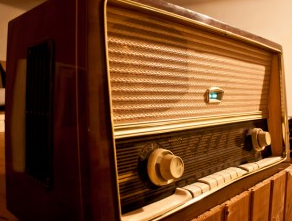A Miracle in Scientific American

A Miracle in Scientific American
 In the latest issue of Scientific American , Michael Shermer describes an amazing and beautiful synchronicity that happened the day of his wedding, just this summer. I hope you read the article, but to summarize, an old non-functioning radio that had belonged to his bride’s beloved grandfather mysteriously started playing a love song as the ceremony was about to commence, only to go silent again the next day.
In the latest issue of Scientific American , Michael Shermer describes an amazing and beautiful synchronicity that happened the day of his wedding, just this summer. I hope you read the article, but to summarize, an old non-functioning radio that had belonged to his bride’s beloved grandfather mysteriously started playing a love song as the ceremony was about to commence, only to go silent again the next day.
The miracle I refer to is not the event itself, but rather the fact that it is recounted in the pages of a top science magazine by Michael Shermer, publisher of Skeptic magazine and a long-time upholder of scientific orthodoxy. His humility and courage in publicly revealing an experience that has, in his words, shaken his core beliefs is exemplary. That this revelation seems to contradict his aggressively argued position of many years makes it little short of miraculous.
Let me be clear what I mean by scientific orthodoxy. It consists of three beliefs: (1) that the dominant institutions of science, and the consensus of scientists, offer a description of reality that is basically correct; (2) that the implicit metaphysical assumptions underpinning the Scientific Method are true, and (3) that the Scientific Method should enjoy a privileged status among all ways to knowledge; that it is the royal road to truth.
The event that Michael Shermer describes would, to most people, indicate that belief #1 above is faulty: that science offers nowhere near a complete description of reality. One might easily conclude that people can communicate from beyond the grave by influencing electronics, or that in moments of heightened emotion meaningful coincidences occur that reflect a layer of causality that is normally invisible to us. But I would like to focus on another element of Shermer’s piece.
As Shermer is abundantly aware, the stunning synchronicity he experienced on his wedding proves nothing about the nature of reality. He says that if anyone else had reported this event to him, he would have explained it away as a random electrical anomaly that, because of its timing, took on emotional significance. By the Law of Large numbers, he says, one would expect occasional coincidences like this, which, because they are preferentially remembered and reported, seem more common than they are. One might easily say, as some of the commenters did, that it was nothing more than perhaps some wires expanding on what might have been a hot, humid day, completing a circuit.
Only this and nothing more.
But as Michael Shermer perceptively notes, the existence of such explanations is irrelevant to the feeling quality of the experience. It “rocked me back on my heels,” he said; it brought him and his bride into a state of awe and gratitude. In the moment, his bride, also a firm nonbeliever in anything supernatural, knew, “My grandfather is here with us. I am not alone.”
Tags
Who is online
81 visitors

Revealingly, Shermer says the experience has shaken his skepticism to the core. But as one of the commenters observed, skepticism isn’t a belief system, it is a process of, as skeptic.com puts it, “employing or calling for statements of fact to prove or disprove claims.” Is it, though? Critics of self-described skeptics point out that what they accept as evidence encodes their own hidden biases as well as their faith in the integrity of the institutions of knowledge production, and that they unwittingly practice the same credulity and closed-mindedness of which they accuse their targets. But these criticisms do not reach to the heart of skepticism: they say, merely, that skeptics practice it imperfectly. When Shermer says his skepticism has been shaken to the core, perhaps he doesn’t mean that his doubts about the usual targets of self-described skeptics – supernatural and paranormal claims – have been shaken. Perhaps what was shaken is his faith in the primacy of a way of knowing: the one that underlies skepticism and the Scientific Method.
It wasn’t a testable hypothesis proven through replicable experiments that rocked Michael Shermer’s world. It was an experience, immediate, subjective, and unreproducible by any normal means.
The one thing about science that bothers me, is when it comes across something that it has no explanation for. This happens most often in medicine, like when a recently dead person, will sit up and look at a person they had been waiting for, which is a very common phenomenon. People will often try to brush it off as residual brain activity... yet even when connected to brain scans, they show dead. Death in itself, has been hard to define as have near death experiences. We just don't have either the tools or the knowledge to define these things.
We have decided that we either know everything, or have the means to know everything. Any other avenues that are beyond the prescribed ones for discovery are anathema, and classified (labeled) as primitive and thusly not worthy of consideration. That, regardless of the truth.
There are more things in heaven and earth, Horatio,
Than are dreamt of in your philosophy.
- Hamlet (1.5.167-8), Hamlet to Horatio
Awesome example and quote!
These sorts of phenopmenon (that science feels it can explain,but really can't) is actually typical of much of our thinking in the west. (It used to be called "left brain thinking").
However in the east they are more "right brain"--- they look at many things quite differently.
(In Buddhism especially, they tend to be less arrogant and self-righteous about "being right" about being right about everything, about "knowing everything")
If we expect to be able to interpret everything we experience with a comfortable pigeon-holed method, our despair and disillusionment is subjectively solvable. Being open to reality right as it happens, right on the cutting edge of the here and now, is a lost, and seemingly perilous art. We have a dire need for exuberant exploration!
Perrie,
I wish I could adequately share with you (and your young doctor daughter) the number of times I have seen a look of bewildered wonderment on doctors faces. We really DON'T know squat. And good doctors know that.
I wish I could adequately share with you (and your young doctor daughter) the number of times I have seen a look of bewildered wonderment on doctors faces. We really DON'T know squat. And good doctors know that.
I have been curious about other dimensions of reality, and alternative forms of healing for some time. If you associate with members of the conventional medical profession, even relatively open-minded ones, there are many things that you may never hear about.
And I forgot to mention where I went today-- I went to an event by a shaman!
She lead us in a few (non-sectarian) prayers and did a few ceremonies. (The energies in the room were amazing). We were seated in a circle. Many there had sicknesses or someone they knew was sick. People shared their prayers for themselves or loved ones. Many of the things the shaman said blew peoples' minds-- how could she know those things? (She was operating psychically, but also on an even higher level). She also did some healing rituals...
For the last few years my major efforts in these areas have been through Astrology, but recently I've gotten back into psychic readings and healings. (I have learned a lot through the Siolva Mind Method, and I've taken the 1st & 2nd Degree Reiki certifications,-- this was decades ago! Now thinking of doing level 3 Reiki which is extremely powerful.
Its late now, but maybe we can talk tomorrow.
Do you know anything about Chakras & Auras? Channeling subtle energies? Studying these things can lead to learning to do healings via "unconventional methods"
Does any of this sound familiar? Have you read anything on the subject?
Some of what you said got me thinking. If you haven't read much about this, I would recommend this one highly-- its a classic, but really excellent. I read it when it first came out-- back then it really blew my mind. (It may explain some things that you may be wondering about):
Hands of Light: A Guide to Healing Through the Human Energy Field
Barbara Brennon
More tomorrow...
Larry,
You should share some of those stories. I would be really interested.
Was the date of the magazine April 1st by any chance?
The event as described by the author in Scientific American was exactly two years ago today (OCT 1st, 2014) and reviewed by Mr Eisenstein in this article about a week later.
Is that all you have?
People have a tendency to mock what they don't understand. This is seen on a daily basis with regard to Indians, religion, healing and meditation.
The connection to the earth and it's energies are foremost in our ''religion''. It really isn't a religion but a way of life for us. Interconnection with all things not just humans lies at the root of our beliefs. Healing comes from nature, plants etc and have for thousands of years. The healing must be of both the physical and spiritual, one cannot heal without the other.
To our Nation, the Ojibwe the healers is the Mide of the Midiwiwin, or the Grand Medicine Society which has been in existence for thousands of years. Finally in the last few years modern medicine is looking toward our past to help with modern medicine. The Mayo Clinic is now working with Mide's to help understand the connection with the spiritual healing. There are also two other major centers of medicine that are involving themselves with the ancient way.
Just on NT the sacred places and power of nature was being mocked. Sadly, if you don't open your mind it will remain shut and without light.
I read the article in Scientific American, and the story is a beautiful example of 'synchronicity'.
Synchronicity is a concept , first explained by psychiatrist Carl Jung, which holds that events are "meaningful coincidences" if they occur with no causal relationship, yet seem to be meaningfully related.
My suggestion is that the transistor radio , which began playing on it's own after three months with new batteries, did not come on and demonstrate a 'miracle', but rather the presence of the people in the house at the time created the meaningful moment.
Let's say that , instead of the wedding being in Beverly Hills, it was held in Hawaii. The couple had gone out there a day or two before, with the radio left sitting in a dresser drawer in Beverly Hills. Unless the radio can think and willfully act on it's own, it would have come on at the same time it did , but there would have been no one there to hear it. There would be no story. If it played all the rest of the time the couple was in Hawaii, by the time they got back the batteries would have died out and no one would ever know the radio did this 'miraculous' thing.
I don't belittle the mystery, and I am open to the concept of miracles. I do think this case is more one of coincidence than miracle though.
My guess is that this whole scenario would have played out very different if a commercial had started playing instead of a sappy love song, or if the station had been set to AM talk radio or a rap station. Once again, emotion trumps reason.